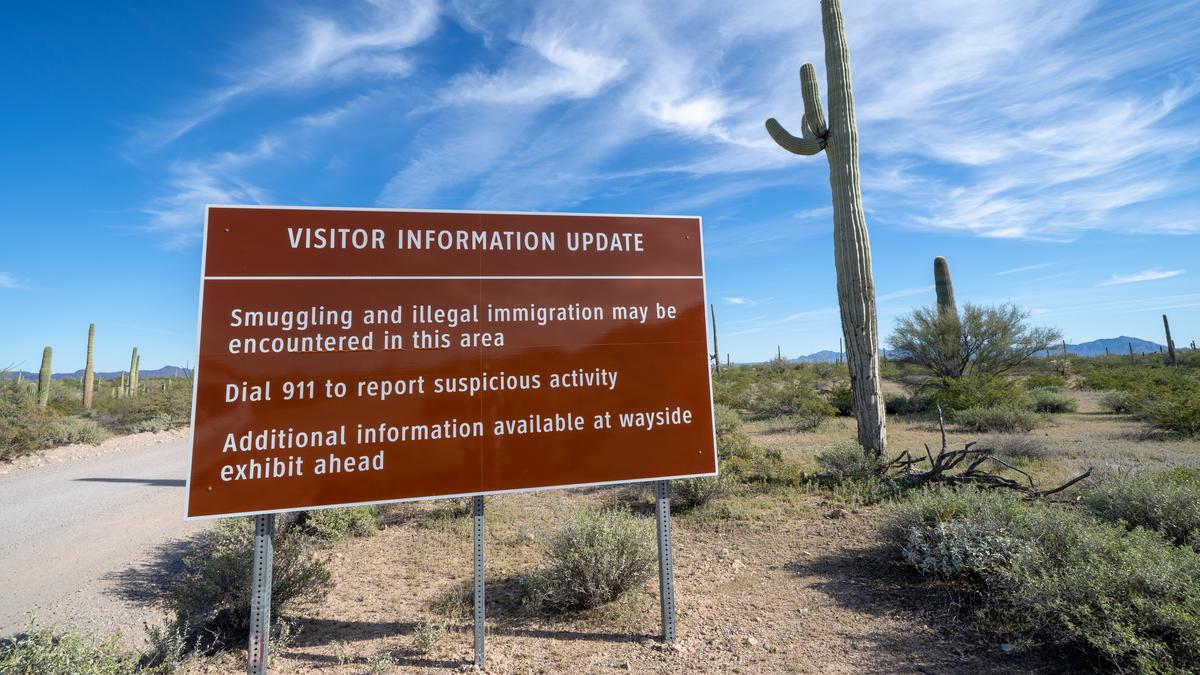
“Every year, countless young Indians attempt what is called ‘irregular migration’”
| Photo Credit: Getty Images/iStockphoto
The planeloads of Indians being deported to India from the United States are lucky to be back alive. Shackled, handcuffed, humiliated and in dire straits, they have flown back heartbroken and in shame. But there is also the case of illegal immigrants from north India clearing ammunition fields in Iraq, who were abandoned. They were brought back home after emergency documents were issued.
However, the key issue here is about illegal immigration. Every year, countless young Indians attempt what is called ‘irregular migration’. Backing them are the ‘unethical merchants of death’ who sponsor this activity and who have proliferated in rural Punjab, Haryana, Himachal Pradesh, Jammu and Kashmir, Kerala and Gujarat. Manpower export — legally called human smuggling or kabootarbazi — is one of the most profitable forms of trade. It requires no technical skill, no educational or professional qualifications, no financial investment, and has no fear or respect for any law, checks, punishment or even criminal action.
Horror and misery
Even though this menace is not new to India, we must learn from what has happened. The tradesmen of these flourishing rackets of human smuggling thrive on gullible youth who fantasise about making it big with dollar-fuelled dreams. In reality they are only waiting to be duped. This is organised crime that perpetuates horror and misery, and flourishes with impunity. Once in the net of these human smugglers, these migrants are vulnerable to exploitation and face grave risks to their life. As the world has seen, they end up being suffocated in containers, perish in scorching deserts, drown at sea or be herded into slave camps to work as forced labour. These human smugglers conduct their activities brazenly, without any regard for a precious human life.
Survivors often narrate harrowing tales of their ordeal — of how they were forced to sit in piles of human waste, deprived of food and water, while others around them have died and their bodies dumped at sea or on road sides. Human smuggling generates high net worth profits for criminals, who in turn fuel corruption and organised crime. This is a deadly business that needs to be combated with grave urgency.
Naive youth fall prey to agents and land up somewhere working as slave labour in ammunition dumps or fields in Iraq, or as illegal immigrants elsewhere, who suffer immensely with no hope of returning home. The smuggling of migrants is a very profitable business with a low risk of detection. For criminals, it is becoming increasingly attractive to deal in human merchandise. The business of death is becoming more organised, involving professional international mafias across global borders.
India needs to be alert and check this global menace. Sadly, the Emigration Act, 1983 — officially ‘an Act to consolidate and amend the law relating to emigration of citizens of India’ — neither defines human smuggling nor looks at the serious problems connected with this deathly trade. Thus, Parliament must waste no time in legislating an Indian human smuggling law. There are pieces of State legislation that are piecemeal and with a limited ambit of application — only to State territorial borders. Having a new central law is a composite solution and Parliament must set the ball rolling. There has been some discussion about the Emigration (Overseas Mobility Facilitation and Welfare) Bill, but its fate remains uncertain. Till then, any piece of State legislation would be welcome. In this, the Government of Punjab deserves praise for its efforts. But, sadly, its implementation is poor.
Punjab’s Act
The Punjab Travel Professionals Regulation Act, 2012, is described as a law to provide for the regulation of the profession of travel agents with a view to check and curb illegal, fraudulent activities, and malpractices such as organised human smuggling in the State of Punjab. Enacted to provide a licensing regime for travel agents, and with penal provisions, it has some regulatory functions to check human smuggling.
In this enactment, “travel agent” means a person who is doing a profession which involves arranging, managing or conducting affairs related to the sending of persons abroad or which arise out of the affairs of persons sent to a foreign country, and shall include a range of activities covering diverse practices. Likewise, “human smuggling” shall mean and include illegally exporting, sending or transporting persons out of India by receiving money from them or their parents, relatives or any other persons interested in their welfare, by inducing, alluring or deceiving or cheating them.
Parliament must act
A comparison of both Acts, i.e., the Emigration Act, 1983 and the Punjab Travel Professionals Regulation Act, 2012, shows that they enshrine regulatory mechanisms for recruiting agents and travel agents separately. Viewed objectively, both have complimentary purposes in their own spheres. They are neither inconsistent or repugnant to each other. In fact, the two laws compliment each other as they provide similar objectives, aims and functions for recruiting and travel agents, respectively. Punjab has enacted a law which no other State in India has done.
Editorial | Not worth the risk: On the U.S., India and illegal emigration
In fact, human smuggling is a silent issue in the Emigration Act. The authority of law vested in Punjab must be exercised to enforce this law. Finally, Parliament must seriously contemplate enacting a national law to control Indian borders to regulate the human smuggling industry and deal with irregularities with an iron hand. Parliamentarians must rise to save precious human Indian lives. There needs to be a central law which has teeth.
Anil Malhotra is an international lawyer, author, an International Academy of Family Lawyers (IAFL) fellow and an alumni of SOAS University of London. He can be reached at www.anilmalhotra.co.in
Published – February 26, 2025 12:08 am IST
